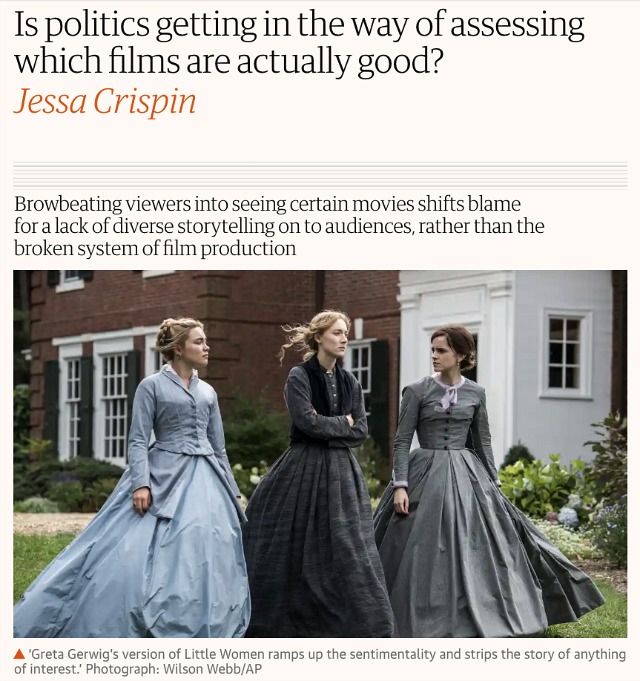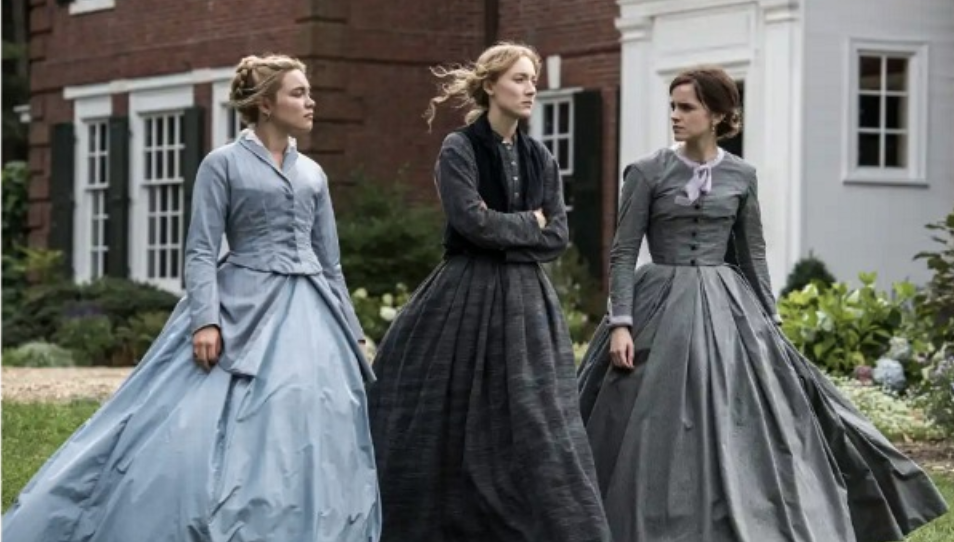In today’s Guardian (1.13) is a brilliant Jessa Crispin piece that basically says that critics have become so political-minded and have chugged so much virtue-signalling Kool-Aid that they’re not only opposed to telling the truth about films as a rule but are pretty much incapable of doing so.
The piece is called “Is politics getting in the way of assessing which films are actually good?”
Excerpt #1: “This was…the year media outlets like the New York Times and Vanity Fair insisted Little Women was mandatory viewing to prove you’re not a misogynist. Even GQ ran a piece implying how important it was men ‘support women’ by watching this film about some white ladies having a hard time during the civil war.
“Men’s supposed lack of interest in Little Women became the dominant narrative of the movie, implying it reveals the (alleged) lack of interest men have, in the words of the New York Times, in ‘see[ing] women as human beings’.

“It couldn’t possibly be that Little Women is just a bad movie — although it is. Little Women is one of those books that has been over-adapted, with five previous film adaptations, plus a miniseries, plus a theatrical production, plus an anime version, and on and on.”
Excerpt #2: “But if you insist that a movie is important, you don’t really have to deal with whether or not it’s good. You can shame people into seeing it as a political statement, rather than as an entertainment or cultural selection.
“Same with the ‘dangerous’ or ‘disturbing’ moniker, which got used on everything from Joker to the latest Quentin Tarantino film Once Upon a Time in Hollywood, which was marked down for everything from not giving its female costar Margot Robbie enough lines to its gratuitous violence against a female would-be murderer to its filming of women’s feet (fetishes are now dangerous, I guess).
“If a critic doesn’t like a film, labeling it as dangerous — and implying you might get killed if you go see it — is an attempt to keep people away.”
Excerpt #3: “Part of this language is the result of our commenting culture choosing to see everything through a political lens. There must be a political reason for Tarantino giving so few lines to a female actor in his latest film, and that political reason must be he does not respect or have any interest in women. There must be a political reason this movie doesn’t have the correct number of roles given to actors of color, and that reason must be that the director is racist.
“Even the female director of a terrible Charlie’s Angels reboot tried to blame the audience’s lack of interest in ‘women’s stories’ for its failure. You know, just the totally normal and relatable stories of regular women fighting crime in very short shorts.
Excerpt #4: “But another reason for this rhetorical madness is the loss of authority the average cultural critic has with the moviegoing audience. There’s always been a divide between what the critical culture celebrates and what audience members actually want to see.
“But browbeating audience members into seeing films by telling them it’s politically important or by swearing this is the most intense and perfect cinematic experience they’ll ever have doesn’t really work, and it only helps their authority slip further away.”

